
NUTRITION
Scope & Guideline
Exploring the intersection of nutrition and health.
Introduction
Aims and Scopes
- Clinical Nutrition and Dietetics:
Research articles that explore the role of nutrition in clinical settings, focusing on dietary interventions, nutritional support strategies, and the impact of diet on patient outcomes. - Nutritional Epidemiology:
Studies that investigate the associations between dietary patterns, nutrient intake, and health outcomes across different populations, contributing to an understanding of public health nutrition. - Metabolism and Nutritional Biochemistry:
Research that delves into the biochemical and physiological processes affected by nutrition, including metabolism, micronutrient interactions, and the role of dietary components in disease prevention. - Nutrition in Special Populations:
Investigations into nutritional needs and interventions for specific groups such as children, pregnant women, the elderly, and patients with chronic diseases, ensuring tailored approaches to dietary management. - Food Security and Public Health Nutrition:
Research addressing the socio-economic factors influencing dietary habits and access to nutritious food, highlighting the importance of food systems in promoting health equity. - Innovation in Nutritional Assessment:
Development and validation of new methods for assessing nutritional status, including bioelectrical impedance analysis, dietary assessment tools, and biomarkers of nutritional health.
Trending and Emerging
- Sarcopenia and Muscle Health:
Research on sarcopenia, its assessment, and its implications for health outcomes is increasingly prominent, driven by an aging population and the recognition of muscle health as a critical aspect of overall wellness. - Impact of Gut Microbiota on Health:
There is a growing body of work examining the relationship between gut microbiota composition and various health outcomes, highlighting the role of dietary fibers and probiotics in maintaining gut health. - Nutritional Interventions for Chronic Diseases:
An increase in studies focusing on the role of nutrition in managing chronic diseases, such as obesity, diabetes, and cardiovascular diseases, reflects a broader understanding of nutrition as a key component of disease prevention. - Nutrigenomics and Personalized Nutrition:
Emerging research in nutrigenomics is gaining traction, exploring how individual genetic variations influence dietary responses and the development of personalized nutrition strategies. - Food Systems and Sustainability:
Research on the sustainability of food systems, including the environmental impact of dietary choices and food security, is becoming increasingly relevant in the context of global health. - Mental Health and Nutrition:
Studies linking dietary patterns and specific nutrients to mental health outcomes are on the rise, acknowledging the significant impact of nutrition on psychological well-being.
Declining or Waning
- Traditional Dietary Patterns:
Research focusing on traditional or culturally specific diets has decreased, possibly as global dietary patterns become more homogenized and the focus shifts to modern dietary interventions. - Supplement Use without Clinical Evidence:
Studies on the efficacy of common dietary supplements without robust clinical backing are less frequently published, as the scientific community emphasizes evidence-based approaches to nutrition. - Caloric Restriction as a Primary Focus:
Research centered solely on caloric restriction has waned, as the field increasingly recognizes the importance of nutrient quality and dietary patterns over mere caloric intake. - Animal Studies in Nutrition Research:
While still relevant, the reliance on animal models for nutrition research has diminished as there is a stronger emphasis on human studies that provide direct evidence for dietary recommendations. - Reductionist Approaches to Nutritional Science:
There is a noticeable decline in studies that simplify complex dietary components to singular nutrients; the current trend favors holistic approaches that consider the interplay of multiple dietary factors.
Similar Journals
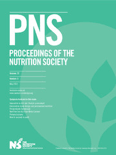
PROCEEDINGS OF THE NUTRITION SOCIETY
Advancing Nutritional Science for a Healthier TomorrowPROCEEDINGS OF THE NUTRITION SOCIETY, published by Cambridge University Press, stands as a leading forum for the dissemination of cutting-edge research in the fields of Nutrition and Dietetics as well as broader medical sciences. With an impressive impact factor and ranked Q1 in both its categories, the journal has established itself at the forefront of nutritional research since its inception in 1944. The journal aims to foster scientific discourse and innovation, presenting a variety of original research articles, reviews, and clinical guidelines that are invaluable to researchers, practitioners, and students alike. Although it is not an open-access publication, access options are available for institutions and individuals, ensuring a wide reach for groundbreaking studies. As a vital resource, PROCEEDINGS OF THE NUTRITION SOCIETY invites submissions that advance understanding of nutritional science, contribute to public health advancements, and promote evidence-based dietary practices.

Revista Chilena de Nutricion
Pioneering Research in Nutrition and DieteticsRevista Chilena de Nutrición is a pivotal academic journal dedicated to the fields of nutrition and dietetics, published by the SOC CHILENA NUTRICION, BROMATOLOGIA & TOXICOLOGIA. With its long-standing history, from its inception in 1981 to its contemporary contributions, the journal serves as a crucial platform for the dissemination of research, insights, and advancements within the nutritional sciences. Although currently not listed as Open Access, its articles are accessible to a diverse audience, including researchers, healthcare professionals, and students, all keen on enhancing their understanding of nutrition science. The journal is ranked in the Q3 category in Food Science and Q4 in Nutrition and Dietetics for 2023, indicating its growing reputation and respectable position in the scholarly community. With Scopus rankings of #281 in Food Science and #106 in Nutrition and Dietetics, the Revista Chilena de Nutrición remains essential for those wishing to remain at the forefront of evidence-based nutritional research and practice.
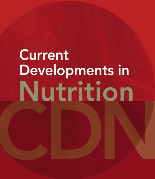
Current Developments in Nutrition
Empowering research that transforms nutrition practices.Current Developments in Nutrition is a prominent open-access journal published by Elsevier Science Inc, specializing in the field of nutritional science. With an ISSN of 2475-2991, this journal has been contributing valuable insights to the scientific community since its inception in 2017, and continues to shape research narratives through 2024. It boasts impressive rankings in the 2023 quartiles, achieving Q1 in Food Science and Q2 in both Medicine (miscellaneous) and Nutrition and Dietetics, highlighting its critical role in advancing knowledge in these areas. The journal is particularly noted for its commitment to disseminating cutting-edge research that influences dietary practices and public health policies. With Scopus rankings placing it in the 75th percentile in Medicine and the 68th percentile in Food Science, Current Developments in Nutrition serves as an essential resource for researchers, healthcare professionals, and students who seek to stay at the forefront of nutrition science. Its open-access model ensures that groundbreaking studies are available to a global audience, further enhancing collaboration and innovation across disciplines.
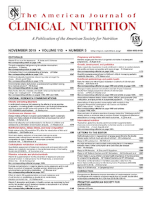
AMERICAN JOURNAL OF CLINICAL NUTRITION
Leading the way in clinical nutrition scholarship.The American Journal of Clinical Nutrition, published by Elsevier Science Inc, stands as a premier academic platform dedicated to advancing knowledge in the fields of clinical nutrition and dietary science. With its roots tracing back to 1952, this prestigious journal boasts rigorous peer-reviewed research, providing vital insights and evidence-based findings that cater to the ever-evolving landscape of nutrition and health care. Affiliated with a strong reputation, the journal holds an impressive impact factor and is ranked in the top quartile (Q1) in both Nutrition and Dietetics and Medicine (miscellaneous), underscoring its significance in the academic community. With current Scopus rankings placing it #7 in Nursing and Nutrition and Dietetics and #20 in Medicine, it serves as an essential resource for researchers and practitioners seeking to stay at the forefront of clinical nutritional science. This journal not only disseminates groundbreaking research but also fosters collaborations among scholars, enhancing the clinical implications of nutrition practices globally. Access to the journal may vary, given its non-open access format; however, its contributions remain indispensable to professionals and students alike striving to deepen their understanding of clinical nutrition.
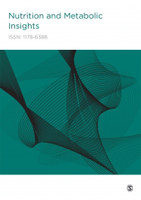
Nutrition and Metabolic Insights
Advancing knowledge in nutrition and metabolic research.Nutrition and Metabolic Insights is a distinguished open-access journal published by SAGE Publications Ltd, dedicated to advancing the fields of nutrition, metabolic processes, and dietary sciences. Since its inception in 2008, this journal has carved a niche for itself within the academic community, offering a platform for rigorous research and innovative findings. With a focus on multidisciplinary approaches, it publishes articles that explore vital aspects of Endocrinology, Diabetes and Metabolism, Food Science, and Nutrition and Dietetics, earning recognition with a 2023 Q2 ranking in Food Science and Q3 rankings in other critical categories. Researchers and professionals can access cutting-edge research that not only contributes to academic discourse but also informs clinical practice and public health discussions. By facilitating the dissemination of knowledge, Nutrition and Metabolic Insights plays a crucial role in improving health outcomes worldwide, making it an essential resource for students, researchers, and health professionals alike.

BMJ Nutrition, Prevention & Health
Championing the future of health literacy and prevention.BMJ Nutrition, Prevention & Health is an influential open-access journal published by the esteemed BMJ Publishing Group based in the United Kingdom. Since its inception in 2019, this journal has quickly established itself as a vital resource for researchers, medical professionals, and students interested in the evolving fields of nutrition, health promotion, and disease prevention. With an impressive impact and notable rankings within its category—Q1 in Health (Social Science), Medicine (Miscellaneous), and Nutrition and Dietetics—it contributes significant insights into dietary practices and public health. The journal's commitment to accessible research is highlighted by its open-access model, allowing global dissemination of knowledge and encouraging collaboration across disciplines. As it continues to converge its findings into 2024, BMJ Nutrition, Prevention & Health remains a cornerstone for advancing health literacy and evidence-based practices, driving forward the dialogue in nutrition science and public health initiatives.
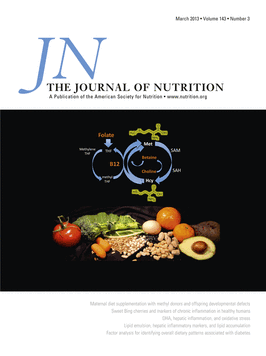
JOURNAL OF NUTRITION
Exploring the vital links between diet and well-being.JOURNAL OF NUTRITION is a premier academic journal published by Elsevier Science Inc, dedicated to advancing the understanding of nutritional science and its impact on health. With a long-standing tradition since its inception in 1945, the journal provides a vital platform for high-quality research, featuring articles that cover a wide range of topics within the fields of Medicine and Nutrition and Dietetics. Recognized for its significant contributions, the journal holds an impressive impact factor, with a Q1 rank in both Medicine (miscellaneous) and Nutrition and Dietetics as of 2023, positioning it among the top tier of scholarly publications in these disciplines. The Scopus Rankings further validate its status, boasting a rank of #57/398 in Medicine and #30/140 in Nutrition, indicating its influential presence in the research community. Although it operates under a traditional access model, the journal actively engages with a global audience of researchers, professionals, and students by disseminating cutting-edge insights designed to inform nutrition policy and practice. By focusing on current trends, innovative methodologies, and evidence-based nutrition strategies, the JOURNAL OF NUTRITION continues to be an essential resource for those committed to enhancing health through nutrition.
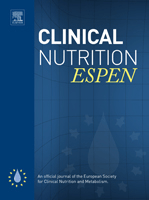
Clinical Nutrition ESPEN
Pioneering Insights in Clinical Nutrition and DieteticsClinical Nutrition ESPEN is a distinguished journal published by ELSEVIER, focusing on the critical intersection of clinical nutrition and metabolic health. With an ISSN of 2405-4577, this journal serves as an essential resource for researchers, practitioners, and students in the fields of Endocrinology, Diabetes and Metabolism as well as Nutrition and Dietetics. Operating out of the United Kingdom, it has garnered a respectable Q2 ranking in both categories for 2023, indicating its significant impact and relevance in the field. Although it does not follow an open access model, the journal offers valuable insights into contemporary nutrition research, clinical practices, and dietary interventions, making it a vital tool for those committed to improving patient outcomes through nutritional science. In its evolving journey, covering work from 2015 to 2024, Clinical Nutrition ESPEN continues to shape the dialogue in nutrition research, addressing pressing health challenges and fostering innovation in dietetic practice.

Advances in Nutrition
Elevating Nutritional Knowledge to New HeightsAdvances in Nutrition is a premier academic journal published by Elsevier Science Inc, dedicated to advancing the field of nutritional science through rigorous research and critical reviews. Since its inception in 2010, this influential journal has positioned itself at the forefront of its discipline, boasting an impressive Q1 ranking in Food Science, Medicine (miscellaneous), and Nutrition and Dietetics as of 2023. With its robust impact factor and distinguished standing, it ranks within the top percentiles of its categories, making it a vital resource for researchers, professionals, and students alike. The scope of the journal encompasses a diverse range of topics related to nutrition, providing a platform for innovative research that influences dietary practices and public health policies. Although this journal currently does not offer open access, it remains accessible through institutional subscriptions, enhancing its outreach and impact in the scientific community.

South African Journal of Clinical Nutrition
Bridging research and practice in clinical nutrition.South African Journal of Clinical Nutrition is a premier academic journal, published by Taylor & Francis Ltd, dedicated to the field of clinical nutrition and its impact on health and wellness. With an ISSN of 1607-0658 and an E-ISSN of 2221-1268, this journal has embraced an Open Access model since 2016, providing unrestricted access to current research and developments in nutrition-related sciences. Originating from the United Kingdom, this journal serves as a vital resource for researchers, professionals, and students, featuring a diverse range of studies that reflect contemporary issues in human nutrition and dietetics. Recognized for its contribution to the field, the journal holds a Q3 ranking in both Medicine (miscellaneous) and Nutrition and Dietetics, signifying a credible platform for disseminating innovative nutritional research. The journal's comprehensive scope ensures that it fosters interdisciplinary dialogue and supports advancements in nutritional science from 2001 to 2024, making it an essential reading for anyone committed to enhancing the understanding of nutrition's role in public health.